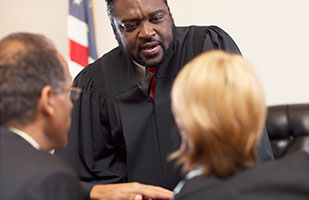Commission Releases ‘Dos and Don’ts’ Guide for Judicial Professionalism

Commission releases judicial professionalism guidelines.

Commission releases judicial professionalism guidelines.
The Supreme Court of Ohio Commission on Professionalism has released the fifth edition of best practices publications titled Professionalism Dos and Don’ts. The series of Dos and Don’ts includes suggested guidelines for judicial and attorney conduct. Today the commission released the Professionalism Dos and Don’ts: Judicial Professionalism, which recommends guidelines for judges in carrying out their professional responsibilities in the courts.
The commission hopes to promote professionalism among Ohio’s judges and lawyers with these guides but does not regulate conduct or discipline. Commission on Professionalism Secretary Lori Keating said the publications will help practicing attorneys, judges, and law school students.
“This is a unique set in our series in that it specifically addresses judges,” Keating said. “Through their interactions with lawyers inside and outside the courtroom, judges set the standard of professionalism for attorneys who appear before them. Moreover, the public’s perception of our justice system is shaped by how judges manage their dockets and run their courtrooms. We hope that this list will be especially helpful to new judges while also reminding experienced judges of best practices for judicial professionalism.”
Some of the Dos of judicial conduct include:
In Pretrial Matters
- Use a case management order with all pertinent deadlines for each case.
- Be accessible to parties to resolve discovery disputes.
- Conduct final pretrial conferences yourself to the extent possible.
In Scheduling
- Be aware of attorneys’ professional and personal schedules before setting a court date or denying a timely motion for continuance.
- Weigh the consequences, cost, and additional expenditure of time and resources that would likely result from cancelling a proceeding and moving forward on another.
- Treat parties, litigants, and others with respect and dignity and create an environment where all persons are treated fairly.
In Conducting Hearings and Trials
- Take the bench promptly and begin hearings at the scheduled time.
- Make decisions after the conclusion of a bench trial in such a manner as will make the litigants feel that their arguments were fully considered.
- Deliver the decision or sentence in a formal, dignified, and neutral tone.
The Dos list also includes professional interactions with attorneys both in and out of the courtroom.
Some of the Don’ts include:
- Hold attorneys or litigants accountable for events beyond their control.
- Chastise, correct, or question attorneys in a demeaning manner.
- Attend an event if it could cause a reasonable person to question a judge’s later impartiality in a pending case.
View the complete list of Professionalism Dos and Don’ts: Judicial Professionalism.
Acrobat Reader is a trademark of Adobe Systems Incorporated.


